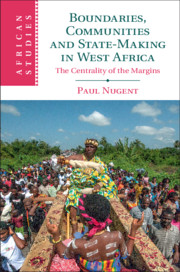Book contents
- Boundaries, Communities and State-Making in West Africa
- African Studies Series
- Boundaries, Communities and State-Making in West Africa
- Copyright page
- Dedication
- Contents
- Figures
- Maps
- Tables
- Acknowledgements
- Abbreviations
- 1 Centring the Margins
- Part I From Frontiers to Boundaries
- Part II States and Taxes, Land and Mobility
- Part III Decolonization and Boundary Closure, c.1939–1969
- Part IV States, Social Contracts and Respacing from Below, c.1970–2010
- 11 Barnacle States and Boundary Lines
- 12 The Remaking of Ghana and Togo at Their Common Border
- 13 Boundaries, Communities and ‘Re-Membering’
- Conclusion
- Bibliography
- Index
- African Studies Series
12 - The Remaking of Ghana and Togo at Their Common Border
Alhaji Kalabule Meets Nana Benz
from Part IV - States, Social Contracts and Respacing from Below, c.1970–2010
Published online by Cambridge University Press: 08 June 2019
- Boundaries, Communities and State-Making in West Africa
- African Studies Series
- Boundaries, Communities and State-Making in West Africa
- Copyright page
- Dedication
- Contents
- Figures
- Maps
- Tables
- Acknowledgements
- Abbreviations
- 1 Centring the Margins
- Part I From Frontiers to Boundaries
- Part II States and Taxes, Land and Mobility
- Part III Decolonization and Boundary Closure, c.1939–1969
- Part IV States, Social Contracts and Respacing from Below, c.1970–2010
- 11 Barnacle States and Boundary Lines
- 12 The Remaking of Ghana and Togo at Their Common Border
- 13 Boundaries, Communities and ‘Re-Membering’
- Conclusion
- Bibliography
- Index
- African Studies Series
Summary
In Chapter 11, I pointed to the very different – and indeed fundamentally incompatible – manner in which incumbent regimes in Senegal and the Gambia responded to the crisis of the early 1970s. I also highlighted the ways in which the enhanced mobility of Senegambians and the accelerated flow of contraband goods together brought about a spatial reordering that was neither in any official plan nor the outcome of any formal cross-border co-operation agreement. In this chapter, I will perform a similar exercise for the trans-Volta with a view to establishing how far comparable dynamics were at play. There are, however, some underlying differences, which it is worth pointing out at the start because they account for some of the variations of emphasis in the text that follows. First of all, as we have seen, Ghana had pioneered a statist vision of development well before the crisis of the end of the 1960s, whereas Togo had yet to find its feet as an entrepôt state by 1967. The points of departure were therefore significantly different from those in the Senegambia. Secondly, a succession of military interventions in Togo (1963 and 1967) and in Ghana(1966, 1972, 1978/9 and 1981) brought another set of forces into the equation. The prolongation of military rule had institutional consequences of its own because the pressure to increase the numbers of armed personnel typically led to greater demands on the budget. In addition, there was a leakage of military norms into other areas of governance, including not only much routine administration, but also border policing. Furthermore, there were more or less explicit demands that the military be considered as partners to the wider social contract. It was only in the Gambia after 1994 that something comparable seemed conceivable.
- Type
- Chapter
- Information
- Boundaries, Communities and State-Making in West AfricaThe Centrality of the Margins, pp. 436 - 483Publisher: Cambridge University PressPrint publication year: 2019



